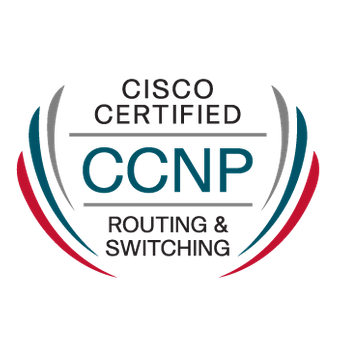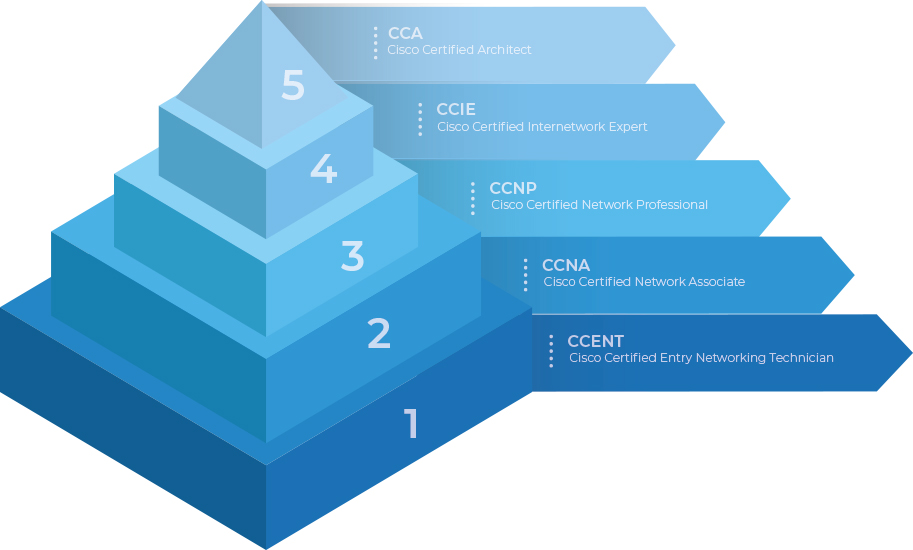Cisco, a global leader in networking technology, offers two highly regarded certifications that cater to IT enthusiasts: the Cisco Certified Network Associate (CCNA) and the Cisco Certified Network Professional (CCNP). Both certifications hold significant value in the IT industry, but they serve distinct purposes. Aspiring IT support professionals often find themselves at a crossroads after several years, deciding to advance their careers towards a Network Engineer career pathway.
Let’s delve into the nuances of CCNA and CCNP, exploring their differences, advantages, and the key factors to consider when choosing the right certification for your career path. Whether you're a budding IT enthusiast or a seasoned professional, understanding the distinctions between these certifications is crucial for making informed career decisions.
CCNA vs CCNP: A brief Overview of the basics
Cisco Certified Network Associate (CCNA) and Cisco Certified Network Professional (CCNP) are two prestigious certifications provided by Cisco. They cater to individuals at different stages of their networking careers, offering distinct levels of expertise and specialisation.
Cisco Certified Network Associate (CCNA) is an entry-level certification designed to provide IT professionals with a solid foundation in networking. It covers fundamental networking topics, such as:
- network infrastructure,
- IP addressing,
- routing,
- switching,
- and security, making it an ideal choice for individuals looking to kickstart their networking careers.
Cisco Certified Network Professional (CCNP), on the other hand, is an advanced-level certification that builds upon the knowledge gained through CCNA. It focuses on complex networking concepts and offers specialisations in various areas, including routing and switching, security, collaboration, data, service provider, and wireless.
Now, let's break down the differences between these two certifications.

What is CCNA certification?
CCNA, which stands for Cisco Certified Network Associate, is an entry-level certification designed for those who are new to networking or looking to establish a solid foundation. CCNA covers essential networking topics, providing a broad understanding of network infrastructure, IP addressing, routing, switching, and security. This certification is a great starting point for individuals aspiring to enter the networking field. CCNA equips you with fundamental networking knowledge, making it an excellent starting point for beginners in the field. It is widely recognised in the industry and can open doors to entry-level networking jobs. While CCNA provides a broad foundation, it allows you to choose specialisations like routing and switching, security, and more to align with your interests.
CCNA serves as a stepping stone for pursuing more advanced Cisco certifications like CCNP.

What is CCNP certification?
On the other hand, CCNP, or Cisco Certified Network Professional, is an advanced-level certification. It is intended for experienced IT professionals who seek in-depth knowledge in the realm of networking. CCNP delves into complex networking concepts and offers various specialisations such as routing and switching, security, collaboration, data, service provider, and wireless. This certification equips you with the skills to design, implement, and manage intricate networks, making it ideal for those aiming for high-responsibility positions in the field.
Delving into the details of CCNA
For those considering a CCNA certification, it's important to delve into the specifics of what this foundational certification entails. Let's explore the key topics covered in CCNA and the benefits of obtaining this certification.
Key topics covered in CCNA
CCNA provides a comprehensive knowledge base for budding IT professionals and aspiring network administrators. This qualification offers a holistic understanding of the networking landscape with fundamentals that not only serve as building blocks for future Cisco certifications, but also equip you with the skills to tackle real-world networking challenges.
CCNA covers a range of fundamental networking topics, including:
- Network Protocols: Understanding various network protocols like TCP/IP, Ethernet, and Routing Information Protocol (RIP).
- LAN and WAN Technologies: In-depth knowledge of Local Area Networks (LANs), Wide Area Networks (WANs), Ethernet, VLANs, and WAN connectivity options.
- IPv4 and IPv6 Addressing: Configuration and troubleshooting of IP addressing, including subnetting and the transition from IPv4 to IPv6.
- Network Security: Emphasis on network security measures, threat detection, and basic security implementation.
- Basic Network Troubleshooting: Identifying and resolving common network issues using troubleshooting methodologies and tools.
- CCNA certification enhances your employability, opening doors to roles like network administrator, network engineer, and technical support specialist.
- Industry Recognition: Employers value CCNA-certified candidates as they demonstrate a strong foundation in networking principles.
- Validation of Skills: CCNA certifies your skills in networking, including network protocols, addressing, security, and troubleshooting techniques.
- Career Progression: CCNA serves as a prerequisite for advanced Cisco certifications, facilitating further career growth.
Benefits of obtaining a CCNA Certification
CCNA certification enhances your employability, opening doors to roles like network administrator, network engineer, and technical support specialist.
Obtaining a CCNA certification offers several advantages:
- Enhanced Employability: CCNA certification enhances your employability, opening doors to roles like Network Administrator, Network Engineer, and Technical Support Specialist.
- Industry Recognition: Employers value CCNA-certified professionals as they demonstrate a strong foundation in networking principles.
- Validation of Skills and Knowledge: CCNA certifies your skills and knowledge in networking, including network protocols, addressing, security, and troubleshooting techniques.
- Career Progression: CCNA serves as a prerequisite for advanced Cisco certifications, facilitating further career growth.
Unpacking the complexities of CCNP
CCNP or Certified Cisco Network Professional is the next step for professionals who have their eyes set on more advanced networking expertise. CCNP delves into more complex networking concepts, making it suitable for experienced professionals seeking in-depth knowledge. Like CCNA, CCNP offers specialisations, allowing you to focus on areas like routing and switching, security, and more.
It equips you with skills to design, implement, and manage complex networks, making you adept at handling challenging roles. CCNP emphasises network security, helping you protect networks against evolving threats.
Key topics covered in CCNP
- Advanced Routing Protocols: In-depth knowledge of advanced routing protocols like OSPF and EIGRP.
- Network Security: Advanced security measures, data protection, and risk mitigation in today's digital landscape.
- Complex Networking Concepts: Comprehensive understanding of network architecture, optimisation, and integration.
- Voice and Wireless Technologies: Proficiency in voice-over-internet protocol (VoIP) and wireless network management.
CCNA vs. CCNP: Difference between certification
Now that we've delved into the details of CCNA and CCNP, it's time to make a side-by-side comparison. We'll explore the differences challenged levels and the various career opportunities they unlock.
Difficulty level: CCNA vs. CCNP
- CCNA is considered an entry-level certification and is relatively easier to achieve compared to CCNP. It focuses on foundational networking concepts and serves as a stepping stone for further Cisco certifications.
- CCNP, in contrast, is an advanced-level certification that demands a more profound understanding of networking principles and the ability to troubleshoot complex network issues. It builds on CCNA concepts and covers more intricate and specialised areas of networking.

Career opportunities: CCNA vs. CCNP
Future career opportunities are a pivotal consideration when choosing between CCNA and CCNP certifications. These certifications not only validate your networking expertise but also significantly impact the trajectory of your IT career.
CCNA can open doors to entry-level roles, laying the foundation for a successful IT career. On the other hand, CCNP, with its advanced knowledge and skills, prepares you for higher-responsibility positions and specialised roles, offering a broader spectrum of opportunities. Deciding which certification aligns with your career aspirations is crucial, as it shapes your professional journey and potential for advancement in the dynamic and competitive IT industry.
CCNA holders are eligible for entry-level roles such as help desk engineer, network technician, IT security specialist, and systems administrator. If you're starting your networking journey or looking to build a foundation in IT, CCNA is a suitable choice.
CCNP certification opens the door to more advanced career opportunities. With CCNP, you can pursue roles like network analyst, IT manager, network engineer, systems engineer, and infrastructure engineer. If you're an experienced IT professional aiming for specialised and high-responsibility roles, CCNP is a valuable certification.
The career opportunities that CCNA and CCNP present are markedly different, aligning with their respective complexity and scope.
- CCNA holders are eligible for entry-level roles such as Help Desk Engineer, Network Technician, IT Security Specialist, and Systems Administrator. If you're starting your networking journey or aiming to build a foundation in IT, CCNA is the ideal choice.
- CCNP certification opens the door to more advanced career opportunities. With CCNP, you can pursue roles like Network Analyst, IT Manager, Network Engineer, Systems Engineer, and Infrastructure Engineer. If you're an experienced IT professional looking to excel in specialised and high-responsibility roles, CCNP is a valuable certification.
Which Cisco certification do you need?
Choosing between CCNA and CCNP is a significant decision that hinges on several factors, including your career goals, experience level, and personal preferences. Let's break down these considerations to help you make an informed choice.
| CCNA | CCNP | |
|---|---|---|
| Career Opportunities | Opens doors to entry-level positions such as Help Desk Engineer, Network Technician, IT Security Specialist, and Systems Administrator. | Unlocks more senior roles like Network Analyst, IT Manager, Network Engineer, Systems Engineer, and Infrastructure Engineer. |
| Difficulty Levels | CCNA serves as an entry point, focusing on foundational networking concepts. | CCNP dives into advanced topics. |
- Career Aspirations: Your career goals and where you want to be in the IT field are crucial. If you're looking for entry-level positions and want to build a strong networking foundation, CCNA is the ideal starting point. In contrast, if you envision a career with more responsibilities and higher pay, CCNP is the path to choose.
- Experience Level: Your experience plays a significant role in this decision. If you're new to networking or have limited experience, CCNA is a logical starting point. It provides a solid foundation and allows you to broaden your networking knowledge. CCNP is ideal if you're an experienced IT professional seeking to advance your skills and take on more challenging roles.
- Specialisation: Consider your interests and whether you want to specialise in a particular area. While CCNA provides specialisations in routing and switching, security, and more, it primarily imparts a broad understanding of networking fundamentals. CCNP allows you to specialise in areas like routing and switching, security, data, collaboration, service provider, and wireless, providing expertise in your chosen field.
- Prerequisites: To qualify for CCNA, you may need to complete the Cisco Certified Entry Networking Technician (CCENT) certification, depending on your chosen specialisation. Some CCNA specialisations don't necessitate CCENT, but may require a strong understanding of IT fundamentals. To qualify for CCNP, you must hold the corresponding CCNA certification aligned with your chosen specialisation.
- Number of Exams: Most CCNA programs require passing a single exam to obtain certification. In contrast, CCNP certifications typically involve more testing, with candidates needing to pass three to four exams, depending on their chosen specialisation.
- Salary Considerations: Salaries in the IT industry can vary based on factors like experience, employer size, geographic location, and the certifications you hold. Generally, IT professionals with CCNP certifications tend to earn more than those with CCNA certifications. However, individual circumstances and work experience play a significant role in determining salary.
Assessing your goals
If you're new to networking or aiming to establish a strong foundation, CCNA is a logical start. For those seeking more advanced roles, CCNP is the way forward. Consider your career aspirations and where you want to be in the IT field. If you're looking for entry-level positions and want to build a strong networking foundation, CCNA is ideal. On the other hand, if you envision a career with more responsibilities and higher pay, CCNP is the path to choose.
The choice between CCNA and CCNP should align with your unique circumstances, career aspirations, and current skill level. Both certifications hold substantial value in the IT industry, and your decision will depend on your specific goals and whether or not you have completed the CCNA already. Whether you're launching your networking career or looking to advance it, these certifications will undoubtedly enhance your networking expertise and open doors to exciting opportunities for professional growth in the dynamic IT landscape.


